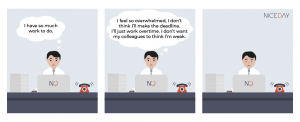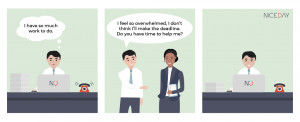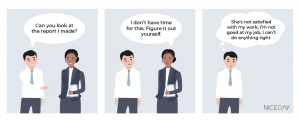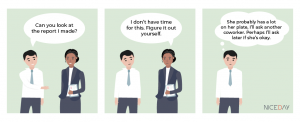Shame and guilt are common feelings for people experiencing a burnout. For example, you may feel ashamed about your complaints or feel guilty towards your employer or colleagues when you are not able to work. In this article, we will explain what shame and guilt are and to what extent they play a role in burnout.
Shame
Shame is an emotion you can experience when you feel embarrassed. It is a global negative self-evaluation. When you are ashamed of something, such as your burnout or certain symptoms that you are experiencing, there is a greater chance that you are less likely to talk about them or hide your symptoms from others.
When you hide your symptoms/complaints due to shame, others will not notice that you are feeling low. Therefore, they are not able to help you when you actually need it. As an example: you are feeling overwhelmed by all the tasks you have and you have lost your to-do list. In addition, you have to deal with approaching deadlines, and you have no idea how you are going to meet them. If you don’t talk about your situation because you feel ashamed, your colleagues will be less likely to offer help or ask how you are doing than when they are aware of your situation. Feelings of shame can actually ensure that your complaints are maintained or can even cause them to worsen.
Shame (unhealthy situation)

Shame (healthy situation)

Guilt
By guilt we mean the unpleasant feeling that arises as soon as you have done or not done something; when you think you have violated a moral standard, for example. Guilt is a negative assessment of specific behaviour.
When you feel guilty, this can automatically motivate you to improve/strengthen the bond with others, again, showing your commitment and sense of responsibility. But excessive or exaggerated levels of guilt can be disruptive and, in some cases, cause psychological and physical distress.
Guilt in the workplace
Feelings of guilt often arise after you have negative thoughts about yourself or others or after you have treated others negatively. Some people see their behaviour as a direct reflection of their self/functioning and do not see other factors that can also influence this (such as circumstances). Because of this, they blame themselves, because they think they are not doing their job well. As a result, they develop feelings of failure and loss of self-esteem. For example: a colleague has problems at home and therefore reacts bluntly, but you relate her reaction negatively to yourself, which reduces your self-esteem.
Furthermore, excessive guilt can leave you feeling like you’re falling short of others and not treating them warmly enough. This can make you want to overstate your interest in others. Then, you overcompensate, which makes you more prone to developing a burnout.
The more guilt you experience, the greater your chance of developing a burnout. You will put in more effort and overcompensate, which takes hard work and will cost you energy.
Guilt (unhealthy situation)

Guilt (healthy situation)

Sources:
Baumeister, R. F., Stillwell, A. M., & Heatherton, T. F. (1994). Guilt: an interpersonal approach. Psychological bulletin, 115(2), 243.
Maslach, C., & Jackson, S. E. (1985). The role of sex and family variables in burnout. Sex roles, 12(7-8), 837-851.
Olivares‐Faúndez, V. E., Gil‐Monte, P. R., & Figueiredo‐Ferraz, H. (2014). The mediating role of feelings of guilt in the relationship between burnout and the consumption of tobacco and alcohol. Japanese Psychological Research, 56(4), 340-348.
Pineles, S. L., Street, A. E., & Koenen, K. C. (2006). The differential relationships of shame–proneness and guilt–proneness to psychological and somatization symptoms. Journal of Social and Clinical Psychology, 25(6), 688-704.
Price, D. M., & Murphy, P. A. (1984). Staff burnout in the perspective of grief theory. Death education, 8(1), 47-58.
Rabasa, B., Figueiredo-Ferraz, H., Gil-Monte, P. R., & Llorca-Pellicer, M. (2016). The role of guilt in the relationship between teacher’s job burnout syndrome and the inclination toward absenteeism. Revista de Psicodidáctica, 21(1), 103-119.
Tangney, J. P., Stuewig, J., & Mashek, D. J. (2007). Moral emotions and moral behavior. Rev. Psychol., 58, 345-372.

 Print
Print 
